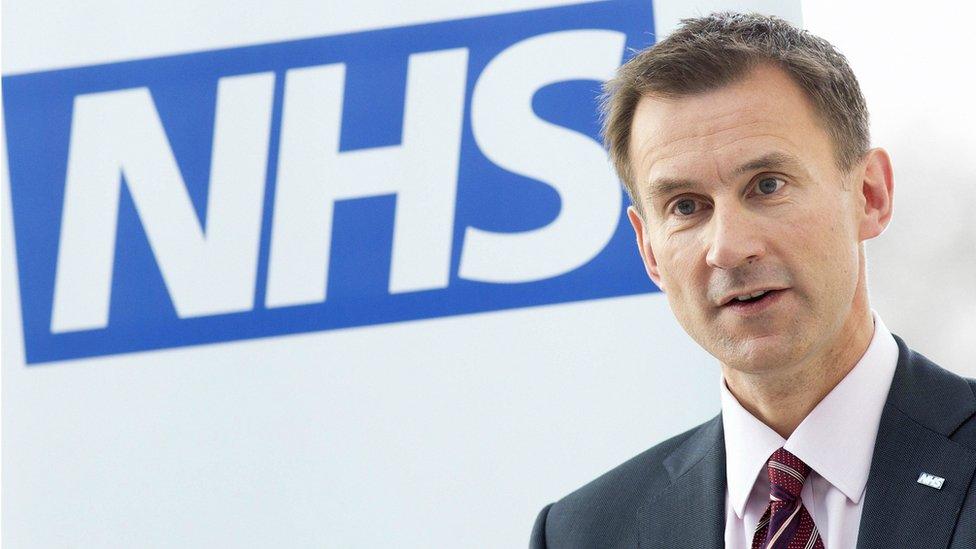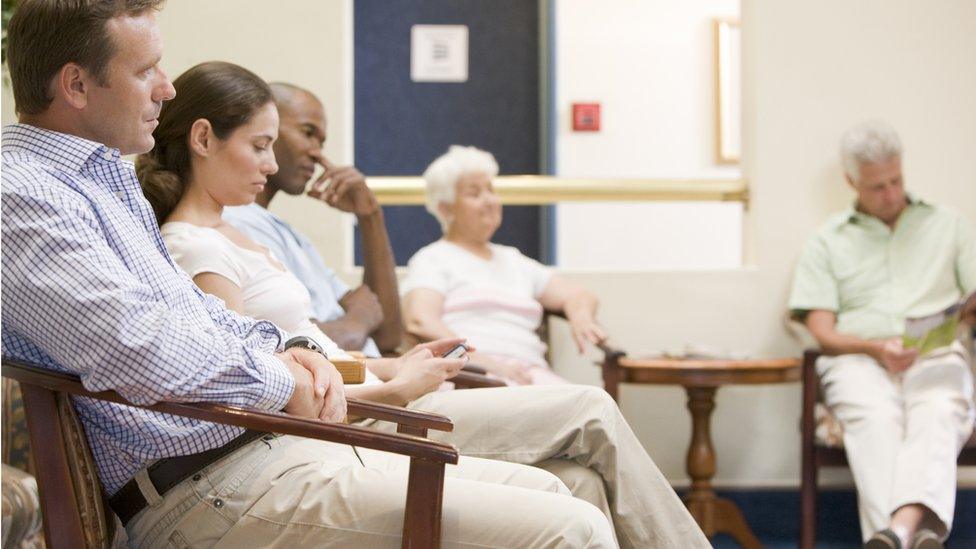Hunt's Houdini act: What next?
- Published

Barring the appointment of Boris Johnson as foreign secretary, the decision to keep Jeremy Hunt in the health brief in England was perhaps the biggest surprise of Theresa May's new cabinet.
Tipped for the chop ahead of the announcement, he ended up keeping his job - but only after it was widely reported he had lost it.
As the first Tory MPs started arriving at Number 10 on Thursday morning, it was suggested he had been sacked, prompting (as you would expect) a fair degree of jubilation among junior doctors on Twitter.
But Mr Hunt was to have the last laugh. The reports were wrong. They soon changed to claims that he was moving to another post before confirmation that he was, in fact, staying put.
A delighted Mr Hunt, who having served nearly four years is already one of the NHS's longest-serving health secretaries, later tweeted "reports of my death have been greatly exaggerated... thrilled to be back in the best job in government".
Rumours abound as to the reasons why he was kept on. Did someone else refuse the post? Did Mr Hunt himself plead to stay put? Possibly.
Or perhaps, with the junior doctors' dispute still raging, the new prime minister didn't want to give the impression there was any going back on the imposition of the new contract which Mr Hunt had started to force through.
Nor will it have been missed by Mrs May that he is also overseeing another key contract renegotiation - the consultants' contract.
Talks have been taking place since the autumn and are now delicately poised as the government tries to realise its ambitions for a seven-day NHS.
But away from the pay of doctors, Mr Hunt still has plenty more on his plate.

Obesity

NHS England chief executive Simon Stevens has called it the new smoking such is the risk it presents to the health of the nation.
For some time, the government has been working on a solution. Its child obesity strategy was due to be published before Christmas, was then delayed until the new year and then until after the referendum.
Even after the result of the vote was announced, government sources were briefing it could still be published before Parliament breaks for the summer next week as David Cameron had taken a personal interest in it and wanted to finish his premiership with some positive policies.
The speed with which Mrs May has been appointed has probably ended any hope of that. But it would be no surprise if Mr Hunt tried to dust if off and get it published as soon as is practically possible.
The government has already committed to a sugar tax - and the obesity strategy was expected to reiterate that as well as setting out how ministers were to tackle everything from the promotion of food in supermarkets to the way it is advertised on TV.
If nothing else, it should generate some good headlines for Mr Hunt - unlike some of the other decisions that await him.

Money, money, money

Despite getting extra money this Parliament, the health service is in the grip of the worst cash crisis in its history. NHS trusts, which run hospitals, ambulances and mental health units, finished the 2015-16 year £2.45bn in the red.
Paying that off threatens to gobble up much of the extra money coming the way of the health service.
Senior bosses have already started work on getting NHS trusts on a better financial footing - in fact an announcement was expected this week before events have, seemingly, put a stop to that.
Mr Hunt will want to get to grips with the issue quickly to ensure his credibility doesn't suffer another blow. Some are even suggesting he should try to get more money out of the new chancellor.

Time to ditch the targets?

If it wasn't for the junior doctors' dispute, the declining performance in the NHS would undoubtedly have received more attention. Targets are being missed left, right and centre.
Over the last year or so, waiting times have risen for A&E, cancer care, routine operations and ambulances with some reaching their worst level for a decade.
Most experts agree that the NHS simply cannot keep up with what is being asked of it and some clear direction of what should be prioritised is needed.
Last year, ministers relaxed the waiting time target for routine operations, while committing themselves to speeding up how long patients have to wait for cancer tests.
There is an argument for going even further. Relaxing the four-hour A&E target could make a big difference, but it would be a brave health secretary who tells the 20 million-plus patients who use emergency departments each year that they should wait a bit longer.
Mr Hunt also faces a wider workforce problem. There are shortages of staff in many areas - an estimated one in 10 nursing posts is currently vacant - and there is a fear the prospect of Brexit could make the situation even worse by deterring EU workers - an increasingly important source of staff - from working here.

Dragging the NHS into the digital age

While medicine has benefited from technological advancements, the NHS has undoubtedly failed to get to grips with how digital technologies have revolutionised the way we communicate and receive services.
For example, when was the last time you emailed your GP or logged on to book an appointment with a hospital consultant? Similar communication issues exist within the NHS itself with staff still relying on paper records and documents to share information when the rest of the world relies on electronic means.
Money has been promised to rectify this. But the NHS is waiting for the Wachter Review - led by US digital guru Bob Wachter - to report.
It was expected to be published in June, but became another victim of the EU vote and is now expected in the autumn.
Making a success of its recommendations will be a tough job. The last major IT drive the NHS embarked on - the £12bn National Programme for IT in 2002 - ended in failure with many of its original aims going unfulfilled or scaled back.

Sorting out the NHS's poorer cousin

It received little attention this week, but the publication of the annual budget survey by the Association of Directors of Adult Social Services made grim reading.
Despite ministers giving councils the ability to raise council tax by 2% to help pay for care services for elderly and disabled people, the system is still drastically underfunded, the survey suggested.
Social care chiefs did not mince their words, saying this will lead to cuts in services, which they argued would have a direct knock-on effect for the health service - and you only need to look at the record levels of delays hospitals are already experiencing discharging patients because of a lack of community care.
The government did have a policy to get the public more engaged with their care needs in their old age - a cap on costs - but this has been punted into the long grass.
The growing problems are not ones, many believe, the health secretary can allow to fester for much longer. But there's a reason why ministers have tried and failed to reform the system since a royal commission called for it to be completely overhauled in 1999 - it's incredibly difficult without chucking a whole load of money at it.